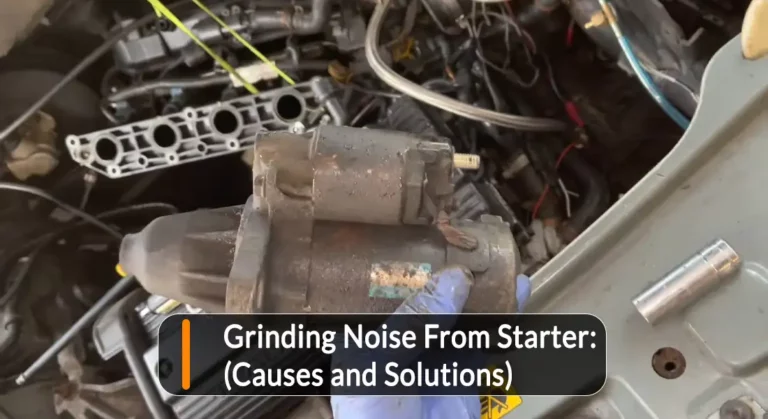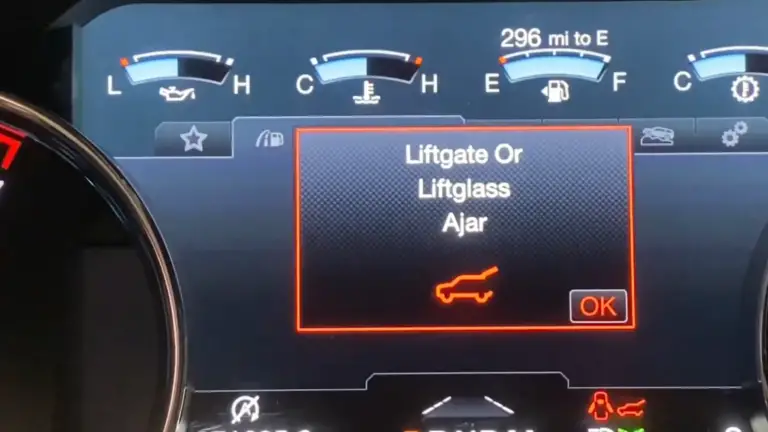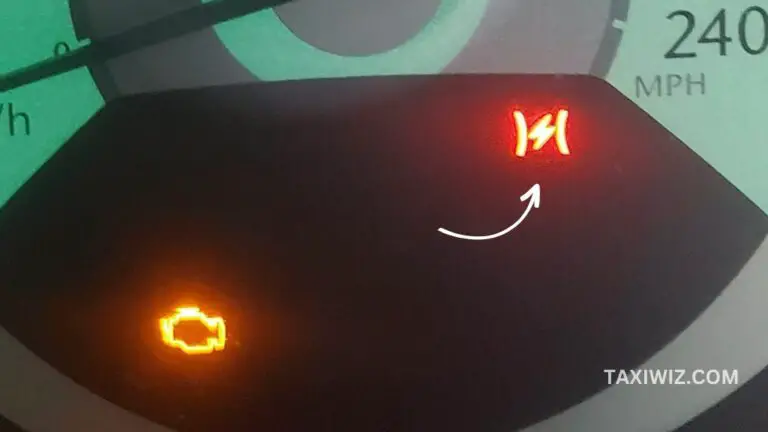High Pitch Squeal When Accelerating – With Fixes!
Have you been hearing a high pitch squeal when accelerating? Then you need to learn the causes behind the high-pitch squeal.
Here are the 8 most common reason for why your car make High Pitch Squeal noise When Accelerating:
- Belt Issues
- Belt Tensioner Problems
- Worn Out or Contaminated Pulleys
- Faulty Idler Pulley
- Misaligned or Faulty Belt-Driven Accessories
- Engine Belt-Driven Fan
- Vacuum Leaks
- Exhaust Leak
Here, we will go through the many reasons behind the squealing noise, and how to diagnose and fix it. Continue ahead to learn all about them.
8 Reasons Why Your Car Make High Pitch Squeal When Accelerating
There are many factors that can induce the high-pitch squeal when accelerating. Let’s see what those are:
1. Belt Issues
Over time, the serpentine belt that drivesseveral components in the vehicle can start todeteriorate. It may start to crack or become glazed, which causes it to lose traction on the pulleys.
When you accelerate, the belt slips on the pulleys which results in a definite high-pitched squeal.
2. Belt Tensioner Problems
The belt tensioner’s job is to maintainappropriate tension within the serpentine belt. In case the tensioner is faulty or worn out, it may not deliver adequate tension to the belt.
This may result in the belt slipping during acceleration, generating a noticeable high-pitched squeal.
3. Worn Out or Contaminated Pulleys
Over time, the pulleys in the engine’s accessory drive system can go through wear and tear or contamination.
The accumulation of debris, dirt, or oil on the pulleys can decrease the friction between the belt and pulley surfaces.
The lack of gripmay cause the belt to slip, resulting in the production of a high-pitched squeal when accelerating.
4. Faulty Idler Pulley
The idler pulley’s role is to guide and retain tension on the serpentine belt. If the bearings within the idler pulley wear out or the face is damaged, it can result in imbalanced spinning.
This uneven motion then causes the belt to slip on the pulleys, leading to a high-pitched squeal during acceleration.
5. Misaligned or Faulty Belt-Driven Accessories
Thepower steering pump, alternator, or air conditioning compressor, are all gears driven by the serpentine belt.
When these parts experience a problem, it results in increased resistance or binding. The increased resistance makes the belt slip on the pulleys, creating a distinct high-pitched squealing noise when accelerating.
6. Engine Belt-Driven Fan
In some vehicles, the engine’s cooling fan is controlled by a belt. If the fan blades are misaligned, damaged, or come in contact with the fan shroud, it can create a high-pitched squeal as the engine speed increases.
This noise is usually more noticeable during acceleration or when under heavy load.
7. Vacuum Leaks
A vacuum leak within the engine’s intake system can produce a high-pitched squealing noise whileaccelerating.
This can happen due to disconnected or cracked vacuum hoses, a faulty intake manifold gasket, or leaks in the vacuum lines. When the air escapes, it creates a distinct whistling or squealing sound.
8. Exhaust Leak
An exhaust leak, such as a cracked or loose exhaust manifold, can cause a high-pitched squeal when accelerating.
The noise is typically more pronounced under load or during aggressive acceleration. The leak allows exhaust gases to escape before reaching the muffler, resulting in the squealing noise.
How To Diagnose What Is Causing the High Pitch Squealing Noise?
Down below, you’ll find the steps you can take to find out what’s causing the squealing sound to occur:
- Identify the Origin
Begin by pinpointing the general area from where the squealing noise is originating from.
While the engine is running, open the hood and vigilantly listen to identify any unusual noise. Keep your attention on the front part of the engine where the pulleys and belts are located.
- Examine the Belts
Conduct a visual inspection of the serpentine belt and other drive belts to assess the condition. Look for signs of cracks, glazing, fraying, or excessive wear.
If you detect any damage, it’s likely that the belt is the culprit behind the squealing noise.
Additionally, do check the tension of the belt by applying firm pressure. It should move a little but not be overly loose.
- Assess Belt-Driven Components
Thoroughly examine the belt-driven accessories, such as the power steering pump, alternator, and air conditioning compressor.
Make sure that their pulleys rotate freely without any resistance or wobbling. If you notice any issues with the accessories or their pulleys, it could mean that they’re potentially contributing to the squealing noise.
- Note Changes During Acceleration
Pay super close attention to how the squealing noise changes when you accelerate. Does it become louder or more pronounced?
These variations can offer valuable insights into the underlying cause. For instance, if the noise intensifies during acceleration, it is likely to be linked to the belt or pulleys.
- Check for Fluid Leaks
Check the fluid levels of components such as the power steering and transmission. Insufficient fluid levels may contribute to the squealing noise.
Be on the lookout for any signs of fluid leaks around the engine compartment, such as puddles or stains.
Leakage of fluids can indicate problems with seals, gaskets, or hoses which can contribute to the production of squealing sounds.
- Inspect for Vacuum Leaks
Assess the intake manifold, vacuum hoses, and other elements of the intake system for signs of disconnection, damage, or leaks.
Use either a handheld vacuum gauge or conduct a smoke test to identify potential vacuum leaks that might be causing the squealing noise during acceleration.
If you are unable to determine the cause of the squealing noise or if it persists even after your inspections, we will recommend you consult a professional mechanic.
They possess the necessary expertise and specialized diagnostic tools to accurately identify the underlying issue.
How to Stop the Squealing Noise?
Here’re some practical solutions that you can follow:
- Belt Inspection and Adjustment
If any cracks, fraying, or excessive wear are detected, it’s essential to replace the worn-out belt. Furthermore, ensure that the belt tension is appropriate.
If the belt feels looser than it should be, adjust the tension according to the manufacturer’s specifications. A properly tensioned belt can help eliminate the squealing noise.
- Lubrication of Belt-Driven Components
Apply a small amount of belt dressing or a recommended lubricant to the belt and pulleys of the affected components.
This will help to reduce friction and stop the belt from slipping, thereby minimizing the squealing noise. Be cautious not to overapply the dressing or lubricant, as excessive amounts can lead to belt slippage.
- Belt Replacement
Even after adjustments, if the belt continues to show significant signs of wear, damage, or persistent squealing it’s recommended to replace the belt entirely.
Do make sure that you use the correct belt type and size required for your vehicle. Properly installing a new belt can effectively eliminate the squealing noise.
- Addressing Fluid Leaks
If fluid leaks are identified as the cause of the squealing noise, it’s crucial to fix the leaks as soon as possible.
Replace damaged or worn seals, hoses, or gaskets in the affected systems, such as the power steering or the transmission.
By guaranteeing proper fluid levels and preventing leaks from occurring, you can eliminate the noise associated with low fluid or fluid seepage.
- Resolving Vacuum Leaks
In case you identify that the vacuum leaks are the cause of the squealing noise, locate and repair the damaged or disconnected vacuum hoses or intake manifold.
Replace any faulty components or gaskets which may be causing the leaks. Having properly sealed and functioning vacuum systems can greatly help to eliminate the noise during acceleration.
Note that if the squealing noise persists despite all your efforts or if you are uncertain about the underlying cause, we will advise you to consult a qualified mechanic.
Frequently Asked Questions (FAQs)
1. Can a misaligned pulley cause a squealing noise when accelerating?
A misaligned pulley can definitely lead to squealing noise as it can trigger belt misalignment and increased friction.
2. Is it okay to continue driving with a squealing noise when accelerating?
While the noise itself doesn’t pose a threat, it does indicate internal underlying problems with your vehicle. So, ignoring it may cause further damage.
3. Is a squealing noise during acceleration always related to the belts?
Not really, no. Even though a loose or worn-out belt is one of the most common causes of noise to occur, there are many other factors that can produce this noise as mentioned above.
Summing Up
To recap, Here are the 8 most common reason for why your car make High Pitch Squeal When Accelerating:
- Belt Issues
- Belt Tensioner Problems
- Worn Out or Contaminated Pulleys
- Faulty Idler Pulley
- Misaligned or Faulty Belt-Driven Accessories
- Engine Belt-Driven Fan
- Vacuum Leaks
- Exhaust Leak
From worn-out bearings to transmission trouble, we explored all the causes behind what triggers the sound along with solutions. Hope you can silence the noise and enjoy a smoother ride!
Related articles:



